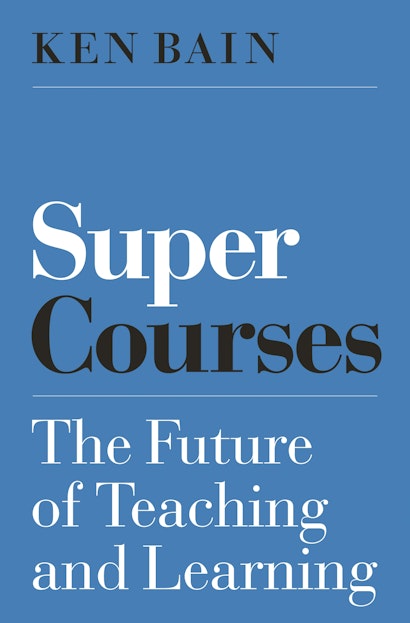Decades of research have produced profound insights into how student learning and motivation can be unleashed—and it’s not through technology or even the best of lectures. In Super Courses, education expert and bestselling author Ken Bain tells the fascinating story of enterprising college, graduate school, and high school teachers who are using evidence-based approaches to spark deeper levels of learning, critical thinking, and creativity—whether teaching online, in class, or in the field.
Visiting schools across the United States as well as in China and Singapore, Bain, working with his longtime collaborator, Marsha Marshall Bain, uncovers super courses throughout the humanities and sciences. At the University of Virginia, undergrads contemplate the big questions that drove Tolstoy—by working with juveniles at a maximum-security correctional facility. Harvard physics students learn about the universe not through lectures but from their peers in a class where even reading is a social event. And students at a Dallas high school use dance to develop growth mindsets—and many of them go on to top colleges, including Juilliard. Bain defines these as super courses because they all use powerful researched-based elements to build a “natural critical learning environment” that fosters intrinsic motivation, self-directed learning, and self-reflective reasoning. Complete with sample syllabi, the book shows teachers how they can build their own super courses.
The story of a hugely important breakthrough in education, Super Courses reveals how these classes can help students reach their full potential, equip them to lead happy and productive lives, and meet the world’s complex challenges.
Ken Bain is an award-winning teacher and the bestselling author of What the Best College Teachers Do and What the Best College Students Do. He taught as a history professor for many years, founded teaching centers at Northwestern, New York, and Vanderbilt universities, and is the president of the Best Teachers Institute. He lives in South Orange, New Jersey. Twitter @KenBain1
"This book can help change how education is viewed, practiced, and implemented."—Choice Reviews
“In Super Courses, Ken Bain draws us in with the promise of superlatives, but make no mistake—his examples offer wisdom that can readily transform a wide variety of courses into more heroic versions of themselves. Through compelling stories and research, Bain asks readers to imagine how we might build on these courses to make even more meaningful experiences for students. I plan to do just that with dozens of ideas gleaned from this enjoyable and inspiring volume.”—Cassandra Volpe Horii, Founding Director, Caltech Center for Teaching, Learning, and Outreach, and former President, POD Network
“Yet another outstanding book by Ken Bain.”—Daniel K. Bubb, University of Nevada, Las Vegas
“Ken Bain’s provocative book, like the courses it describes, invites readers to think deeply about teaching, learning, and perhaps even the role education can play in society. Grounded in learning sciences and pedagogy research, Super Courses explores an array of case studies of fascinating approaches to teaching, challenging us to consider how to build student passion, curiosity, and autonomy into our teaching and learning. Super Courses will leave many teachers eager to find ways to reimagine their own classes.”—Bruce Lenthall, Executive Director, Center for Teaching & Learning, University of Pennsylvania
“Super Courses will be of great use for all teachers.”—Jennifer Snodgrass, Appalachian State University
“Super Courses offers specific and useful examples for promoting deep and meaningful learning. But I am most moved by the way Ken Bain’s book promotes the development of the student as a human being. These courses work not only because of a set of research-based strategies, but because of the powerful assumption that students are curious, altruistic, social, and aspirational human beings. The super courses profiled here are built on that understanding and thus promote human flourishing as well as learning.”—Pamela E. Barnett, Dean, School of Arts & Sciences, La Salle University

